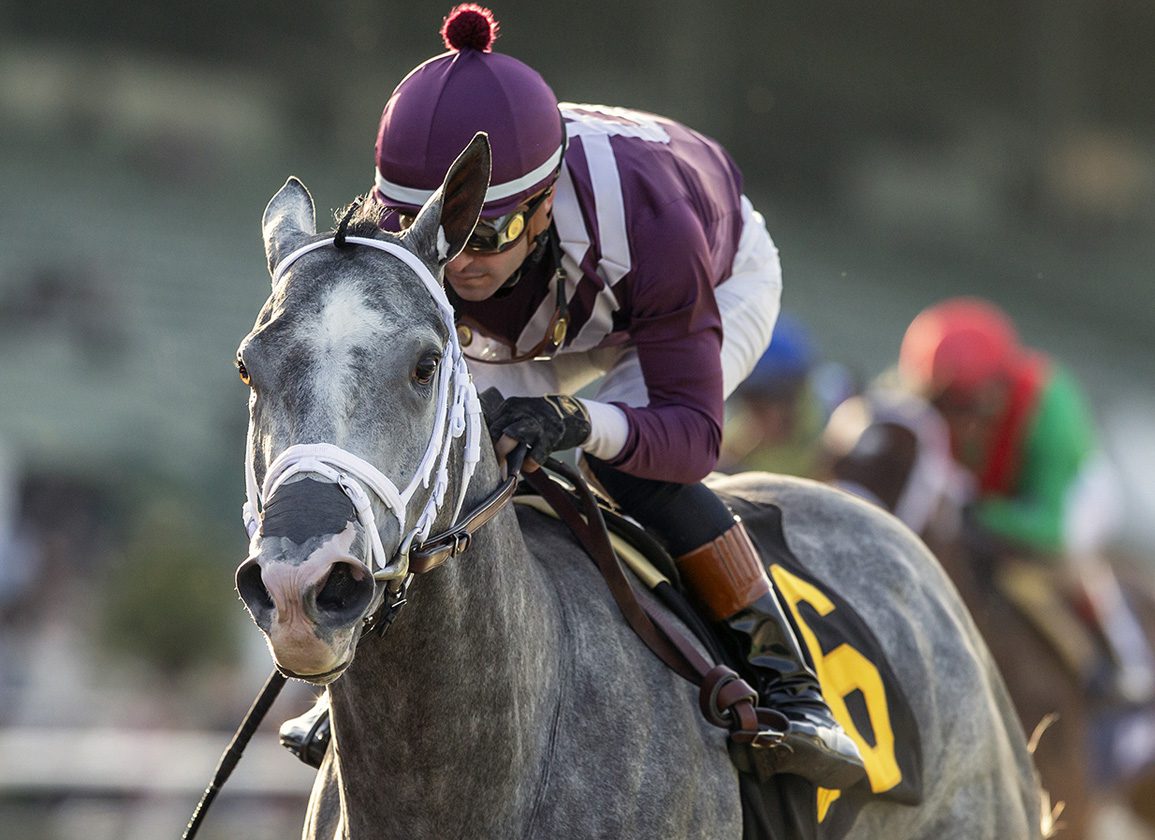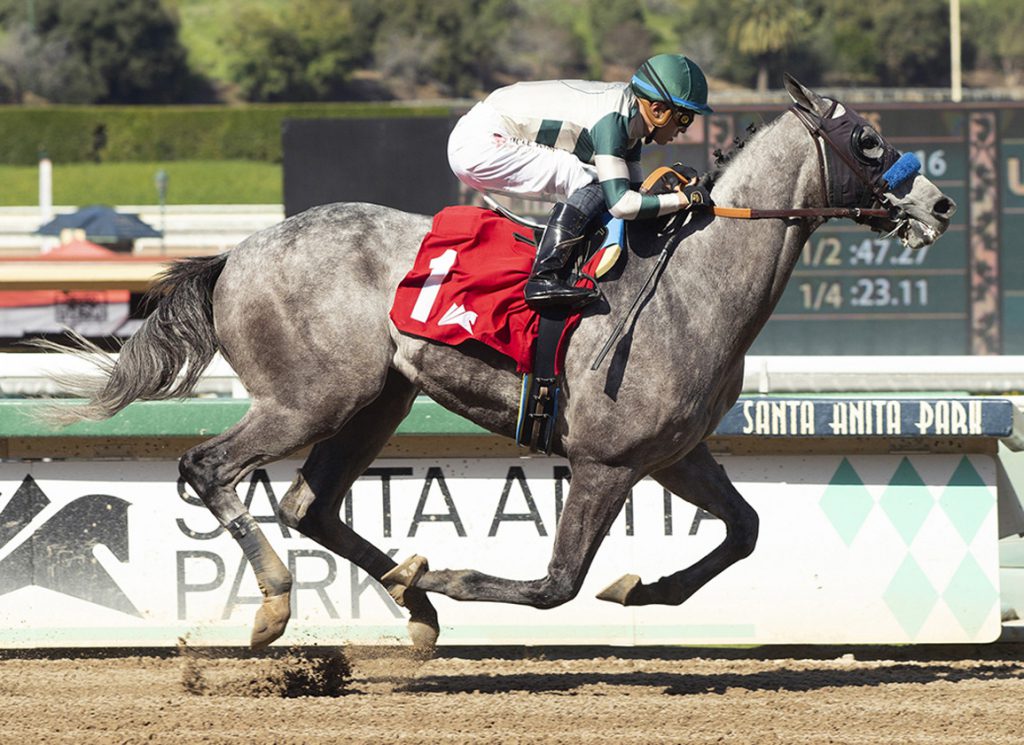By Chris McGrath
Quite a few horses have lately nourished the illusion that we might, collectively, actually know what we're doing. Sierra Leone (Gun Runner), for instance, is threatening to make sense of the second-highest price paid for an American yearling in 2022; while Newgate (Into Mischief) is steadily working off a $850,000 debt of his own, while similarly bringing closer the real payday at stud.
But last weekend we were given yet another reminder of the genetic powder-keg lit by a mating strategy that can only have prompted a supercilious smile in any professional analyst who happened to notice it at the time. Certainly it feels safe to assume that Cecilia “Cee” Straub-Rubens required none of the systems or software being expensively peddled today in order to decide that Cee's Tizzy loves Cee's Song.
Straub-Rubens had bought both as yearlings, Song for $50,000 in 1987 and Tizzy for $72,000 the following year. After their serial matings produced first Budroyale and then the mighty Tiznow, the sire was given little credit by those who in 2001 gave the Straub-Rubens estate $2.6 million for Cee's Song. Instead they repeatedly “upgraded” the mare to Storm Cat. Luckily two of these $500,000 covers were funded by the sale of the final Tizzy-Song yearling, who had been acquired in utero. That filly would go on to produce Oxbow; another Tizzy-Song sibling meanwhile came up with Paynter; while still another is now granddam of GI Kentucky Oaks fancy Tarifa (Bernardini).
Happily a parallel line persists between this amazing dynasty and its founder, whose daughter Pamela Cee Ziebarth retained another of the Tizzy-Song crew, Tizsweet, long enough to breed (with Michael Cooper) an El Prado (Ire) filly named Sweetitiz. She never made the track but Ziebarth retained her to breed half-dozen named foals–much the best of whom was So Sweetitiz (Grand Slam), whose four wins in Ziebarth's silks included a couple in stakes company.
And now So Sweetitiz has restored to elite participation the program that launched her family, through the success of her daughter Sweet Azteca (Sharp Azteca) in the GI Beholder Mile.
That was a remarkable performance on only her fourth start, beating five-time graded scorer Adare Manor (Uncle Mo). For Tarifa and now Sweet Azteca to be simultaneously elaborating the legacy–with siblings respectively figuring as their second and third dams–confirms the Tizzy-Song “marriage” as one of the happiest quirks of the modern breed.
Nonetheless we owe a footnote to Sweet Azteca's sire, who had just embarked on his second year at stud when his former trainer was arrested. The shocking revelations about Jorge Navarro surely hastened a slump in support for a stallion who had amassed no fewer than 194 other mares, besides So Sweetitiz, in his debut book in 2019. By 2021, he was down to 36, and it was a similar story in 2022–the year he launched his first runners.
Well, not even Justify, Bolt d'Oro or Good Magic (all working from similarly large crops) could match Sharp Azteca's 35 individual winners as a freshman. Unfortunately, this evidence of an authentic genetic prowess appears to have come too late. Although his book revived to 113 last year, in the fall it was announced that the son of Freud was off to Shizunai Stallion Station.
While Sweet Azteca is his first graded stakes winner, we know that emigration to Japan often proves the prelude to a transformation in fortune. And remember that two of the four foals Halo gave blue hen Ballade (Herbager {Fr}) eye each other across Sharp Azteca's pedigree: Saint Ballado as sire of his damsire Saint Liam, and Glorious Song as dam of Freud's damsire Rahy.
In the meantime, it's fun to note that Sweet Azteca's grandsire Freud and third dam Tizsweet are respectively siblings to Giant's Causeway and Tiznow, joint authors of one of the great modern races. Moreover the contrast in their parentage–Storm Cat-Mariah's Storm vs. Cee's Tizzy-Cee's Song–reproves us that we remain an awfully long way from figuring it all out.
Will We See the Joke Come Derby Day?
Both his sophomore starts having turned into such messy races, he's yet to be dignified by flashy numbers. But don't underestimate Domestic Product (Practical Joke) after he scrambled home in the GIII Tampa Bay Derby.
In the GIII Holy Bull S., everybody was so preoccupied with the disappointing comeback of the champion juvenile that few gave adequate heed to the way Domestic Product finished for second, despite absolutely everything going wrong through the race (involved in bumping early, battled his rider against the slow pace, wide on the turn). Now he has somehow overcome another cortege of a race, summoning amazing late splits to collar a useful rival who had been much better positioned.
For now, however, his longest race remains the nine-furlong maiden he won at Belmont last fall. And while it has obviously turned out that he had a class edge there, it still feels paradoxical that he was equal to such a searching test as a juvenile.
His sire flattened into fifth in his own Derby bid, and duly returned to the GI Hopeful course and distance for the GI Allen Jerkens. Since retiring to Ashford in 2018, Practical Joke has been treated primarily as a conduit of Into Mischief speed, and even his tragic son Practical Move appeared to approach the limit of his stamina when himself on the Classic trail last spring. Practical Joke has had good performers over longer trips in Chile, but domestically the likes of Skelly and Tejano Twist have branded him as a speed influence.
We know how Into Mischief himself has managed to stretch out his stock with the upgrading of his mares, and conceivably that may yet happen for Practical Joke as his own fee moves rapidly north–now $65,000, after he covered a staggering 252 mares at $25,000 last year. He has maintained monster books throughout and, given the sheer volume of his commercial output, his ratios have held up very respectably. But his dam was a talented sprinter by Distorted Humor out of a Gilded Time mare, and overall the family appears to offer little latent stretch.
Domestic Product himself is out of an unraced mare by Paynter, who may well have put some fuel in the tank. But her own mother (albeit sister to a nine-furlong graded stakes winner on turf) was a stakes sprinter by Cherokee Run, who won the GI Breeders' Cup Sprint in the colors of J. Mack Robinson's daughter. The Atlanta businessman–who helped to launch a young fashion designer named Yves Saint Laurent–bred the second, third and fourth dams of Domestic Product and collectively they suggest limited foundation for a second turn.
Domestic Product must have been a fairly ordinary weanling, as owner-breeder Klaravich Stables sold his dam–plus a Complexity filly in utero–at Keeneland that November for just $37,000. With her brother's timely update (plus a :10 flat breeze) behind her, the Complexity filly made $220,000 from Louis Dubois, agent for Wesley Ward, when offered by Sequel Bloodstock at OBS on Tuesday.
Poignantly, however, this is the bargain mare's final foal: she aborted her next one, and has since succumbed to laminitis. What a strange, marvelous, head-wrecking game this is!
Drummer Finally in Rhythm
The emergence of Kinza (Carpe Diem) among the leading fillies of her crop was pretty timely, with her GIII Santa Ysabel S. success coming on the eve of a new 2-year-old sales cycle.
She was an inspired pinhook by Grassroots Training and Sales, from $30,000 OBS October yearling to $350,000 Timonium 2-year-old last year. Her sire had by then been given a new lease of life in Louisiana, having been reduced to just 11 mares in 2021, his final spring in Kentucky.
We have long become familiar, however, with the ability of Bob Baffert–not forgetting the reciprocal genius of Donato Lanni–to discover elite caliber in left-field horses that had often, somewhere along the line, fallen within reach of many a humble barn.
Those achievements, over the years, have naturally earned the support of bigger spenders, not least the gentleman who signed the docket for Kinza.
For quite a while Michael Lund Peterson could have been forgiven for thinking that the $850,000 he gave for a colt from the debut crop of Gun Runner at OBS April in 2021 was not going to pay off quite as well as the likes of Gamine (Into Mischief). Flying Drummer (Gun Runner) was the outsider of three Baffert runners when duly only fifth of seven behind Corniche in the GI American Pharoah S. and, though he did break his maiden on the last day of the year, he then disappeared for 17 months. After resurfacing briefly last summer, he was again sidelined until an impressive comeback at Santa Anita in January.
Having posted a 94 Beyer there, last weekend Flying Drummer doubled down for a 9 1/2-length romp that confirmed his connections are now being rewarded for their perseverance. Admittedly they will have to keep reaping the rewards on the track, as the 5-year-old has meanwhile been gelded.
Obviously we're not going to run short of sons of Gun Runner at stud, but it would have been nice to see damsire Successful Appeal retain some tenuous influence on the breed. His daughters also gave us the mare Letruska (Super Saver) and the gelded C Z Rocket (City Zip), which may leave only Tapwrit to recycle some of that Florida zip on any scale.
Absolutely His Fault
The most precocious broodmare sire in town these days is clearly Blame, whose latest star in that role is thriving GII Azeri S. winner Tiny Temper (Arrogate).
Her dam Don't Blame Me only won a maiden, but she was placed in her only start in graded company and Brookstone Farm did well to buy her for $120,000 at the same Keeneland November Sale in 2020 where the weanling Tiny Temper herself was found by Hunter Valley Farm for $240,000.
At the time Don't Blame Me was carrying a filly by Gun Runner, who made $350,000 as a yearling. Nice work, but Tiny Temper herself is very much a tribute to the long game. For she and her dam were both sold only following the death that summer of their breeder Alan S. Kline, who had bought Tiny Temper's fourth dam for $17,000 back in 1983. At the time she was carrying a Dr. Blum filly, who went on to be stakes-placed herself before producing perhaps the Kline program's two most accomplished graduates, stakes winner Forestier (Forestry) and graded stakes winner Unbridled Hope (Unbridled).
Kline, whose Maryland farm bore the charming name of Honey Acres, sent Forestier to Blame in 2011 and the result was Don't Blame Me. That was the stallion's first year at Claiborne, so the mating can only go down as a successful guess. But the evidence is now out there for all to see. If your broodmare band is lacking a little something, then perhaps it's high time you, too, took the Blame.
Not a subscriber? Click here to sign up for the daily PDF or alerts.









